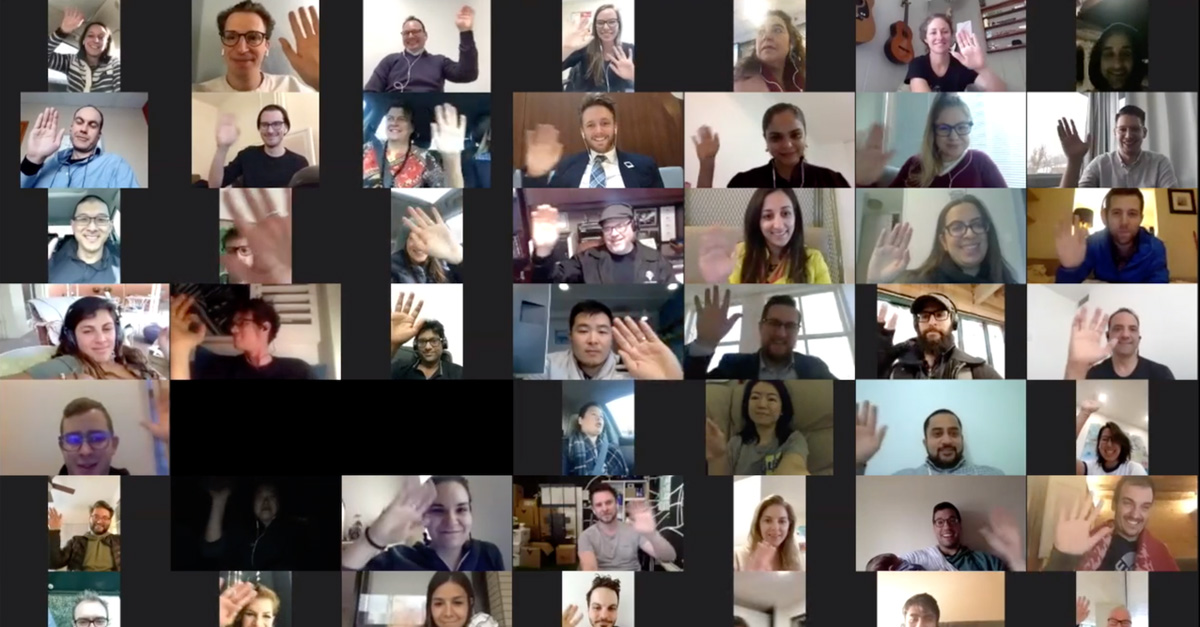Think of the last time you were involved in kicking off a new project. How was the experience of getting everyone aligned around the vision and started on the actual work? Was it smooth and quick, or did you encounter some bumps along the way?
In most organisations, the process of starting something is equal parts exciting and challenging. Apart from securing funding and aligning schedules, every team must go through a process of storming, forming and norming before they become highly effective.
At DiUS, we specialise in helping our customers deliver strategic initiatives. Our mantra has long been ‘bring us the business problem and the outcome you are striving for, and we will lead the charge in collaboration with your people to bring it to life’.
COVID-19 has thrust a new reality upon us when it comes to doing business. For the majority of people, we have been accustomed to meeting and collaborating face to face — particularly when working in groups, or when kicking off new initiatives. DiUS has well-established techniques for getting the relevant people aligned and the ball rolling on delivery, which we are adapting to be effective in this new context where everyone is working remotely.
Last year I participated in Seth Godin’s altMBA – a month long, intensive program which is conducted 100% virtually with participants spread all around the world. It was an amazing learning experience (some field notes here). I was in the 29th cohort, so it was incredible to experience how they had iterated on and refined the learning design to be so effective for a distributed, virtual group of people who had never met in person before.


Here I am with the 29th altMBA cohort (I’m bottom left)
Combining my many years of workshop facilitation experience at DiUS with what I have learnt about virtual collaboration through my involvement in the altMBA plus other virtual conferences, here are my thoughts on three ways you can get your new initiatives off on the right foot:
1. Invest time and money in your whole remote setup
Having good audio and video plus a solid internet connection is a prerequisite and a no brainer. So much is communicated through facial expressions and tone of voice, so the better these nuances are captured and transmitted, the higher bandwidth the communication. But also think about things like the backdrop to your video picture (it should not be distracting), and how to limit background noise.
My preferred setup is attaching my iPhone to a tripod (I love my Glif mount!), and using that to dial into the meeting. That way I can easily maintain eye contact with the other participants and can put the phone in a comfortable position. It frees me up to use my laptop as required, and if I need to share my screen, I dial in separately from my laptop and mute its speaker and microphone to avoid feedback.
2. Foster the group dynamic very mindfully and deliberately
The techniques used by the altMBA to promote and accelerate cohesion across a group who had never met before were very powerful. For example, before the start of the program everyone receives a box of around 10 books. This shared pre-reading created a common thread which in turn provided shared understanding for the virtually hosted conversations and exercises to leverage. So think of creative ways to create these threads for people in advance of a workshop, which might even involve posting something physical to them.
Zoom’s Breakout Rooms feature is something I have seen used to great effect by both the altMBA and LAST Anywhere (the virtual version of Australia’s Lean Agile and Systems Thinking conference). Breakout Rooms enable the host of a Zoom video conference to press a button that breaks up all of the participants on a Zoom call into smaller groups, which can be either automatically or manually assigned. This dovetails nicely with one of my favourite group facilitation techniques called 1-2-4-All, which is all about creating space for people to think individually, and then exploring a topic as small groups before presenting back to the wider group.
Having someone to support the main facilitator is especially important in a virtual environment in case of technical difficulties, and also to help lift the energy in case the conversation lulls. It is handy to have a private, text based back channel setup between the facilitators in advance to chat about any issues or to prompt ideas.
As always, seek to get the right people in the workshop, and to not make the group bigger than it needs to be — even if being virtual makes it possible or tempting to increase the group size.
3. Remember, we collectively have a lot of relevant experience to draw on
While it’s perfectly natural to feel daunted by being thrust into new ways working and collaborating, we must remind ourselves that many of us have already been doing the really hard aspects of forming teams and starting projects for years. We have been involved in co-design workshops before, and online meetings were already commonplace for most people before COVID-19. So while we will need to get creative, and to put some extra effort into workshop design and harnessing the outputs given our new constraints, we won’t need to reinvent the wheel. Our instincts along with tried and true techniques are still relevant.
As this crisis unfolds, the business community will play a critical role in the response. All of our respective customers and suppliers will be affected in multiple ways, and we share an important responsibility to keep the economy moving as we respond to the emerging needs.
Being collaborative, user centered, lean and fast to market will be more important than ever. We’ve all been practicing this for years, and now it is our opportunity to kick up a gear and really put it into action.

